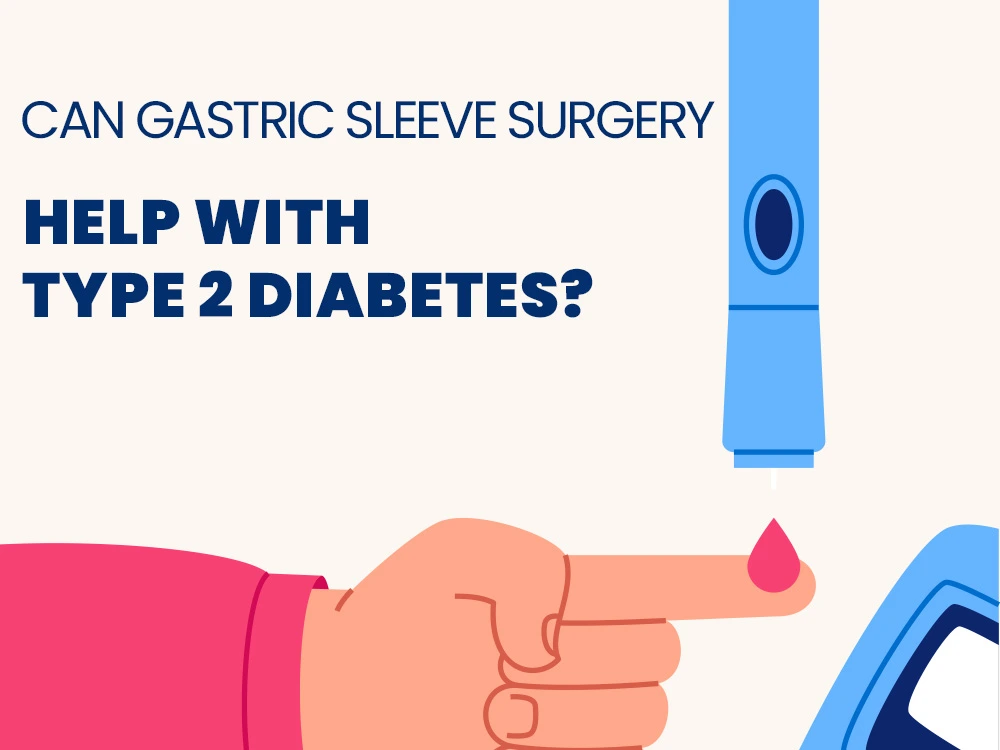
Type 2 diabetes is a chronic condition that affects how your body processes blood sugar (glucose). It is often linked to obesity, and managing both conditions can be incredibly challenging. While lifestyle changes like diet and exercise are often the first line of defense, they are not always enough to control blood sugar levels, especially in cases of severe obesity. This is where bariatric surgery, particularly gastric sleeve surgery, has gained attention for its potential to help with the management of type 2 diabetes.
Gastric sleeve surgery, also known as sleeve gastrectomy, is a weight-loss surgery in which a large portion of the stomach is removed, leaving a smaller “sleeve” or tube-like structure. This procedure helps patients lose weight by limiting the amount of food they can eat, leading to significant weight loss. But beyond weight loss, research has shown that gastric sleeve surgery can have a profound impact on managing or even reversing type 2 diabetes. In this post, we’ll explore how gastric sleeve surgery can help manage type 2 diabetes and what you should know before considering the procedure.
The Link Between Obesity and Type 2 Diabetes
Obesity is one of the primary risk factors for developing type 2 diabetes. Excess body fat, particularly abdominal fat, can interfere with the body’s ability to use insulin effectively. This results in insulin resistance, where the body needs more insulin to keep blood sugar levels under control. Over time, the pancreas becomes less able to produce enough insulin, and blood sugar levels rise, leading to the development of type 2 diabetes.
In many cases, weight loss can significantly improve insulin sensitivity and blood sugar control. For individuals with severe obesity and type 2 diabetes, bariatric surgery offers a solution that can lead to both weight loss and improvement in diabetes management.
How Gastric Sleeve Surgery Affects Type 2 Diabetes
Gastric sleeve surgery works by limiting the amount of food that can be consumed, which leads to weight loss. However, the benefits of this procedure go beyond just eating less. Several mechanisms explain how gastric sleeve surgery can improve type 2 diabetes:
1. Improved Insulin Sensitivity
After gastric sleeve surgery, weight loss can lead to significant improvements in insulin sensitivity. As patients lose weight, their bodies become better able to use insulin effectively, reducing the need for high levels of insulin to control blood sugar. This means that individuals who had been insulin-resistant may experience better blood sugar control after surgery.
Studies have shown that many patients who undergo gastric sleeve surgery see improvements in insulin sensitivity within weeks of the procedure. In some cases, patients experience a complete reversal of insulin resistance, which can lead to normalized blood sugar levels.
2. Hormonal Changes After Surgery
The gut plays a crucial role in regulating metabolism and blood sugar control through various hormones. After gastric sleeve surgery, changes in gut hormones, such as ghrelin, GLP-1, and peptide YY, occur, which can have positive effects on blood sugar regulation.
- Ghrelin, often referred to as the “hunger hormone,” decreases after surgery. This reduction in ghrelin levels helps decrease hunger and may also play a role in improving insulin sensitivity.
- GLP-1 (glucagon-like peptide-1) levels increase following gastric sleeve surgery. GLP-1 is a hormone that helps regulate blood sugar by stimulating insulin production and slowing gastric emptying. Elevated levels of GLP-1 contribute to better blood sugar control, making it easier for the body to regulate glucose.
- Peptide YY, another hormone involved in hunger and satiety, also increases post-surgery, contributing to reduced appetite and better glucose regulation.
These hormonal changes, along with weight loss, can contribute to significant improvements in blood sugar control, even in patients who were previously insulin-dependent.
3. Weight Loss Reduces Fatty Liver and Inflammation
Obesity often leads to the accumulation of fat in the liver, a condition known as non-alcoholic fatty liver disease (NAFLD). Fatty liver can worsen insulin resistance and contribute to diabetes-related complications. Gastric sleeve surgery leads to significant weight loss, which can reduce liver fat and improve liver function. As a result, insulin sensitivity improves, and blood sugar control becomes easier.
Additionally, weight loss following gastric sleeve surgery reduces systemic inflammation, which is another factor that can interfere with insulin function. As inflammation decreases, the body’s ability to regulate blood sugar improves.
4. Rapid Improvements in Blood Sugar Levels
One of the most remarkable effects of gastric sleeve surgery is how quickly blood sugar levels improve. In many cases, patients experience a dramatic drop in blood sugar shortly after surgery, even before significant weight loss occurs. This is thought to be due to the hormonal and metabolic changes that take place in the body post-surgery.
In some cases, individuals who were previously taking insulin or other medications for diabetes may be able to reduce or eliminate their medication needs after surgery, as their blood sugar levels stabilize.
What the Research Says: Gastric Sleeve Surgery and Type 2 Diabetes
Numerous studies have investigated the impact of gastric sleeve surgery on type 2 diabetes. According to a study published in The Lancet Diabetes & Endocrinology, up to 60-80% of patients who underwent bariatric surgery saw complete resolution or significant improvement in their type 2 diabetes. This is particularly true for individuals who underwent surgery early in the course of their diabetes, before significant damage to the pancreas and other organs occurred.
Another study published in Diabetes Care found that gastric sleeve surgery resulted in long-term improvements in blood sugar levels, with many patients remaining in remission for years after the surgery. Even patients who did not achieve complete remission often had better blood sugar control and required less medication.
Is Gastric Sleeve Surgery Right for You?
While gastric sleeve surgery can be highly effective in managing type 2 diabetes, it is not a one-size-fits-all solution. The procedure is generally recommended for individuals who have a body mass index (BMI) of 40 or higher, or for those with a BMI of 35 or higher who have obesity-related health conditions, such as type 2 diabetes.
Before considering gastric sleeve surgery, it is important to discuss your options with a healthcare provider who specializes in bariatric surgery. Your doctor will evaluate your overall health, the severity of your diabetes, and other factors to determine if gastric sleeve surgery is appropriate for you.
Calculate your BMI score with BMI calculator.
Post-Surgery Care for Diabetes Management
After gastric sleeve surgery, it is important to continue monitoring your blood sugar levels and follow your healthcare provider’s recommendations for managing type 2 diabetes. Although many patients experience a significant improvement in blood sugar control, maintaining a healthy lifestyle with a balanced diet, regular exercise, and routine medical check-ups is essential for long-term success.
Additionally, some patients may need to adjust their diabetes medications post-surgery, especially if their blood sugar levels improve significantly. Regular follow-up appointments with your healthcare team will help ensure that your diabetes remains under control and that any necessary adjustments are made.
Gastric sleeve surgery offers more than just weight loss—it can be a game-changer for individuals struggling with type 2 diabetes. By improving insulin sensitivity, regulating blood sugar levels, and reducing the need for diabetes medications, gastric sleeve surgery can help many patients achieve better control of their diabetes, and in some cases, even achieve remission.
If you’re living with type 2 diabetes and are struggling to manage your condition, gastric sleeve surgery may be an option worth considering. At Novemedical, we specialize in bariatric surgery and can help you understand whether this procedure is right for you. Request a free consultation today to learn more about how gastric sleeve surgery can help you regain control of your health and manage your diabetes.





